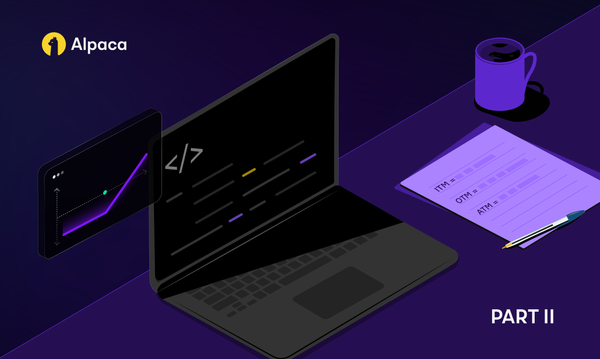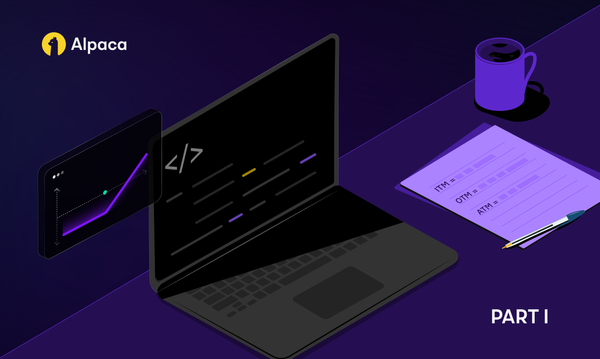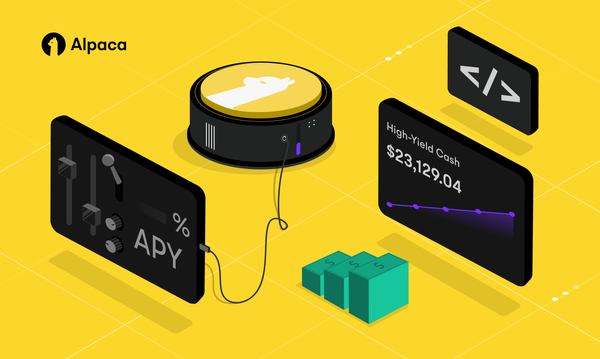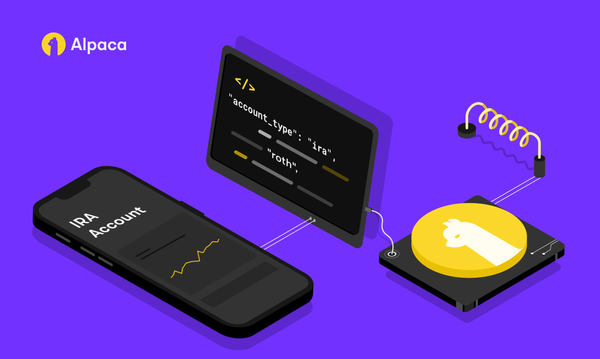Brendan Wood from PASSIV #006
On our sixth episode of Fintech Underground by Alpaca we interviewed Brendan Wood; co-founder of Passiv, a modern portfolio management tool.
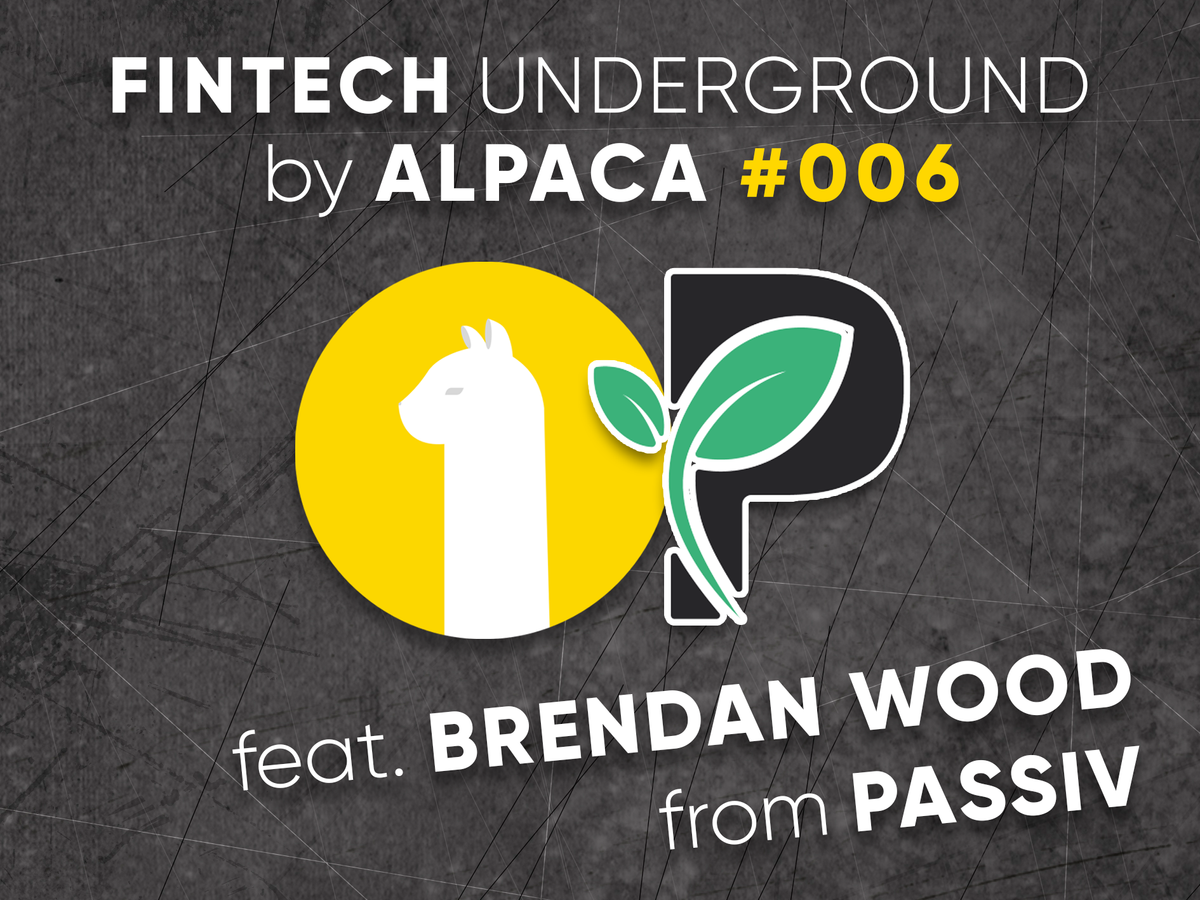
Any opinions expressed are opinions of the host and their guests. Alpaca Securities LLC does not recommend any specific investments or investment strategies.
Fintech Underground by Alpaca is a podcast devoted to all topics related to stock trading and APIs. From trading with algorithms or connecting apps or building out services, we aim to bring light to the different corners of Fintech.

TL;DR
On our sixth episode of Fintech Underground by Alpaca we interviewed Brendan Wood. As the Cofounder of Passiv, a modern portfolio management tool with over a billion dollars in invested assets, Brendan discusses how Passiv makes it easier for DIY investors to maintain a balanced portfolio at their online broker.
Summary
Brendan Wood originally began his career at Pricenomics, a blog used for pricing consumer goods, however, he is most well known for co-founding Passiv. As a modern portfolio management tool, Passiv is integrated with multiple online brokers making it easier for investors to maintain a balanced portfolio. Today Brendan joins us to discuss his experience starting Passiv focusing on the market fit for their product and navigating the necessary regulations. From there Brendan discusses Passiv’s roadmap which includes support for Crypto and introducing more use cases.
Find the full transcript below. To hear more CEO/Founders of the most interesting Fintech companies speak about their experience in the industry check out our other episodes below
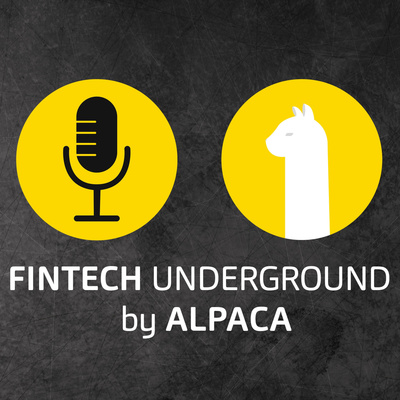
Full Transcript
Jason: Welcome to FinTech underground by Alpaca, a podcast devoted to stock trading API from trading, with algorithms to connecting apps, to building out services. Alpaca built for developers and traders. And with that being said, let's get started. Hello everybody. Welcome back to FinTech underground by Alpaca.
[00:00:17] In each episode, we aim to explore a different area within FinTech. I am very excited for today's episode with Brendan Wood, the co-founder of Passiv - a modern portfolio management tool. As usual, our host is Yoshi - CEO and co-founder of Alpaca. From building your own personalized index to investing and rebalancing with the click of a button, to seamlessly managing multiple accounts, Passiv makes it easier for DIY investors to maintain a balanced portfolio and build a passive investment strategy at their online broker. So let's get started.
[00:00:48]Yoshi: Hey, Brendan, how are you? It's been long.
[00:00:51] Brendan: Yeah, it's been a long time, Yoshi. Nice to see you again.
[00:00:53]Yoshi: Yeah. Thank you. Thank you. I wanted to say really, really thank you for taking your time to appear on our podcast today, FinTech Underground. you know, I know we have a lot to talk about with you and what you do at Passiv. It is a really cool platform that you do to make sure that passive investing is happening in the right way from your web portal, connected to a lot of, you know, cool broker-dealers, of course, including Alpaca.
[00:01:14] But do you want to give a quick introduction of what you do at Passiv and you know, how you get there to start doing the Passiv?
[00:01:21]Brendan: Absolutely. So Passiv is an investing service for self-directed investors. Essentially what you do is you link it to your brokerage account. You can set a target portfolio in Passiv and Passiv will help you figure out which trades you need to make in order to stay on target.
[00:01:34] And it will even help you make those trades by batching them together and taking the friction out of it. You can kind of think of it like a do it yourself Robo-advisor that gives you full flexibility over how your portfolio is invested.
[00:01:44] Yoshi: Nice. Nice, nice, nice. And you know, who are the main users of your platform?
[00:01:49]You know, I know they're having the real, just like Wealthfront Betterment, completely autopilot. Yours is a little bit different, like sort of what kind of users have been using and loving your platform?
[00:02:00] Brendan: So our core user base are people who like to invest in broadly diversified ETFs. So they're trying to sort of match market returns and maybe with a few minor adjustments, rather than picking every individual stock that they're investing in.
[00:02:12] So a lot of the people that end up using our platform are people coming away from mutual funds and other Robo-advisors. They've been investing for retirement, or what have you, for five to 10 years at this point, they've built up a decent nest egg. And now they're at the point where the management fees are starting to eat into their investments.
[00:02:29] And so this is sort of like the right moment for switching to self-directed investing, moving your money into ETFs, and managing it yourself. And so our software is essentially a service to help you do that more easily. It sort of takes the tricky bits out of it, the tedious bits.
[00:02:41] Yoshi: Nice, nice, nice. And you know, so of course, like we have seen a big surge in the, you know, self-directed investing after COVID everything stay at home and then, you know, Game Stop.
[00:02:52] How has been the impact of those things on your platform?
[00:02:55] Brendan: In terms of like impact on the business, it's probably been largely positive and that like, people are thinking about their investments more than ever. So there's that. It's, we've been seeing, you know, substantial growth in the user base.
[00:03:05]We actually just passed a billion dollars in invested assets on our platform.
[00:03:09]Yoshi: Congratulations, man. Billion dollars. Big.
[00:03:11] Brendan: We're really comfortable. Yeah. And you know, it's less, it's not even so much about the money because it's not like we're earning off a percentage of that, but it's really more that it shows that people are trusting the platform and, you know, using it to their own benefit.
[00:03:23] Yoshi: Got it. Got it. You touched a little bit of you know, your business model and revenue model. Do you want to touch a little bit on that? Explaining how it works?
[00:03:31] Brendan: Sure. So like I said, you connect your brokerage account to Passiv and you do that because Passiv is not a broker. We don't hold your money and we don't give advice.
[00:03:39] We're essentially a software layer that you can run on top of your broker. And, you know, Alpaca is a perfect example of that. Like, you know, you guys are an API first broker you're designed to work with third-party tools like ours. And so our whole thesis is that it shouldn't really matter where your money is, as long as you're with a broker that supports, you know, the basic things that we need in order to run our software on it.
[00:03:57] Yoshi: Cool. Cool. And you know, I know that you've been doing the Passiv for quite a long time. It's not like you started it this year or last year because of this whole situation. And, but now I feel like I see more low-code no-code platforms. And then also those FinTech companies popping up, like how have you been keeping up with the competition and how have you been keeping your edge in a way, in your opinion.
[00:04:19] Brendan: We've been doing, you know, a lot of feature development. You know, the first version of Passiv was so simple. It was something that you could implement in a spreadsheet, you know, five minutes if you wanted to in terms of just the bare calculations, but really the integrations are the strong point of saying, well, you know, not only are we doing the calculations for you, but we're keeping track of it.
[00:04:36] And we're telling you when things need your attention and we have trade integrations with your broker. So you can just place this batch of orders in a second, rather than you know, manually placing them all yourself. That's kind of the big thing. There's actually like, not - in terms of connecting to brokers if you want to build an app that runs on top of lots of different brokers, you sort of have to build all those integrations yourself at this point.
[00:04:56] And that's a huge barrier to entry for people. So you know, as we just kind of build these things out ourselves and also kind of improve the functionality and the feature set that we have, it makes it sort of difficult for others to keep up.
[00:05:07] Yoshi: When did you launch your platform? At the very, very beginning.
[00:05:10] Brendan: It was four years ago.
[00:05:11] Yoshi: Nice, nice.
[00:05:12] Brendan: So we started with just one broker in Canada and it really was actually the broker that I was using. And the only reason we even launched it is, like, I had this problem myself and was like “I’m going to scratch my own itch and write this thing and who knows, maybe somebody else will benefit from it as well”.
[00:05:25] And we had such positive feedback from the first broker we supported that we just kind of decided to expand and bring it everywhere.
[00:05:31] Yoshi: Yeah. So you know, we met in actual face to face, you know, drank beer and talked about a lot of things. Like, I don't know, a couple of years ago, a few years ago, but you know, you are doing this from Canada and you started from Canada.
[00:05:42] How was your experience? What were you doing before Passiv and how did you meet the other Brendan, who's your co-founder in Canada, and start doing this?
[00:05:50]Brendan: Yeah. So before I started Passiv I was working for a Y Combinator company called Priceonomics. That was kinda my day job. It was, you know, like a software developer there and it was interesting and a lot of fun.
[00:06:01]Eventually you know, it wasn't like an overnight decision to move to Passiv. It was sort of a side project that I started originally with my business partner who is also named Brendan. We started that and it was, it wasn't something that we took super seriously at first it was just sort of a thing.
[00:06:14] Well, you know, we'll put it out there and see if people use it. And so it was only about a year and a half in that we saw, you know, enough positive signs that we said, maybe we should probably take this seriously enough that we quit our jobs and, you know, go big or go home.
[00:06:27] Yoshi: And the other Brendan came from the DJ and music world.
[00:06:31] Brendan: Right. That's right. Yeah. Yeah. So we actually didn't really know each other before we started the company. And that's, that's sort of like an interesting thing about us. You know, most, most companies that have co-founders are probably founded by people who know each other to some extent, right? He and I had actually met just a few weeks prior at a party of a friend of ours.
[00:06:49] And we were introduced to like, Oh Brendan, there's another Brendan here. Isn't that funny? Right. And immediately we kind of hit it off and realized that we had complimentary skill sets and a shared desire to go do something. And so it was a few weeks later I told him, Hey, I've got this thing I'm working on.
[00:07:03] You want to help? And it just kinda snowballed from there.
[00:07:05] Yoshi: So I wanted to, you know, get into this regional thing. Right. Because you know, I don't come from the United States, I come from Japan. And I see like, in our investors, many investors come from both the US and Canada. As Alpaca, you know, we talk to a lot of FinTech entrepreneurs globally.
[00:07:21]You know, I think Canada is an interesting place, of course, because it's, you know, right next to the US market. And of course even the same language and everything, but there's so much regulation difference. And, you know, how it's being operated has been super different. How was the experience like, you know, starting off your product and the company in Canada, and now, like, you know, you're expanding your offering to the US of course, including from Canadian broker and adding a US broker like alpaca, you know, how was the journey there?
[00:07:50] And like, you know, what is that you noticed being the starting the business from Canada?
[00:07:54] Brendan: Well, there are pluses and minuses to starting in a place like Canada. There are things that have kind of like, just like you said, the regulatory environment in Canada is a lot stricter than it is in the United States and in many other places in the world.
[00:08:05] And so that was somewhat of a challenge because it meant that we had to deal with regulatory issues relatively quickly, even though we're a pure software company. But the benefit of that means that by being compliant with Canadian securities laws, it means that we're almost by default compliant with the rest of the world, right?
[00:08:19] It means there's very little additional work that needs to be done in order to move into another country. And obviously, we do our homework when we do that, but so far it's been relatively straightforward. So we kind of had to do the hard stuff when we first launched the app. And now it's a whole lot easier to kind of roll out to the next place after that.
[00:08:34] Yoshi: That makes sense. And you know, you've touched a little bit on this, but you remain and, you know, stay as a software provider instead of the regulated financial institution. I think like, you know, a lot of developers, entrepreneurs coming from tech, get to this question in my opinion, where, okay, what I'm doing right now, does this like, need to be regulated?
[00:08:55] And like, you know, what is the line that it starts, you know, needed to be regulated? Like how, how did you learn those things? Like, you know, how does your experience those things so that you are now super knowledgeable about, okay, we probably shouldn't do this. Or maybe we should be checking with the lawyer.
[00:09:11] Like, how did you learn those stuff? Like, you know, coming from like pure tech background and now remaining as a tech provider,
[00:09:17] Brendan: So when we first launched the service in Canada we didn't know any of this, as you can imagine. Right? Like, I don't have a fintech background, neither does my business partner.
[00:09:25] Right. It was kind of starting from scratch. And it was probably two or three months after we launched it. There was a lawyer here in the town we live in and we told her about what we're working on and she said, Ooh, that sounds a little sketchy. That sounds to me like you guys are giving advice, financial advice.
[00:09:40] Are you regulated? We said no. And she said, well, you'd better talk to a lawyer.
[00:09:45] Yoshi: How did she pop up? How did she pop up? Like, you know, she just came knocking on your door or like they just met with her at a party or.
[00:09:51] Brendan: She works in the entrepreneurial community here. And they kind of like have these office hours things, right?
[00:09:56] Where if you have questions, you can come in and ask them. So we were talking to her about something unrelated. And when we told her what the app did, she was just like, that raises red flags. I'm going to give you the contact information for someone at your local regulatory office. You should have a chat with them.
[00:10:09] And so we had a brief chat with them and they said, straight up, you guys are giving advice. This is not allowed. You need to shut it down. Right. And we're like, Whoa. You know, very surprising and concerning at the time.
[00:10:22] Yoshi: After you guys decided to start your thing like full-time or is that before?
[00:10:27] Brendan: This was before we had done it full time, we'd only just launched and we weren't even incorporated at the time, it was still very much a side project mode.
[00:10:33] So we were like, Oh, well, you know, at least we didn't raise a pile of money on this and whatever. But anyway, we had some follow-up meetings with the regulators. And we essentially made our case to them and said, look at this and compare it to this spreadsheet that's available for free online and look at how the functionality is basically the same.
[00:10:48] It's just that ours has a buttery, smooth user experience, and Excel is kind of janky. And once we explained it like that and showed that, you know, we're not putting people into portfolios, we're not telling them how to invest their money. It's a tool they can use to do it better. That's when the light bulb came on for the regulators and said okay, this actually sounds fine.
[00:11:04]But there are some, you know, boundaries you need to be aware of, right. And so going through this process, the first time got us started, and then there've been subsequent times we've gone through it as well. So basically every time we release a major feature that we know is, kind of on the edge or something that others haven't done in Canada before we, you know, hit the sounding board of the regulator and tell them, this is what we're doing. What do you guys think?
[00:11:24] Yoshi: Right. So like, you know you actually talk with the regulator persons. Yes.
[00:11:28] Brendan: Yeah. We have direct relationships with them. Yeah. When it started, we actually kind of intermediated through lawyers and we found that that actually made things a whole lot worse. It was harder to get the points across because it's sort of like that telephone game.
[00:11:41] Like the whisper game, when you whisper something to your friend when you were a kid and it gets slightly mutated along the way, it's better to just speak with them directly and tell them right what you're doing. That's what we found anyway.
[00:11:49] Yoshi: It's for the regulator. Could you explain like, you know exactly who, who they are like from the US side, like, you know, we are in very close contact with the FINRA and the SEC on their side, but you know, Canada who specifically are you dealing with in terms of the regulators?
[00:12:03] Brendan: There are a few different regulatory bodies, you know, every province has its own as well.
[00:12:07] So. I guess you could say it's kind of like the SEC except that instead of having, you know, one SEC, that kind of makes the rules that apply broadly, it's sort of done from a ground-up perspective on a per province basis. And most of the provinces are very closely aligned in how they do things. So, you know, if you're compliant with one, it's relatively easy to be compliant with the next one.
[00:12:26] But anyways there's a local group here in New Brunswick who are. The regulators for this province and we have relationships with them. And when there's a question that they can't answer directly, they essentially bring it up to the national Canadian Securities Administers board and discuss it there.
[00:12:39] And then we kind of get that feedback bubbled back down.
[00:12:41] Yoshi: When I started the business, I always am scared about this whole concept of a regulatory body. You know, of course, like, I don't feel that that way, but how has been the kind of reaction and the attitude towards like new, cool stuff that, you know, you're doing for the regulator's eyes?
[00:12:58] Like, you know, are they like, okay, let's do it. Let's figure this out because like, you know, you always have this kind of fear. That they could shut things down right. At the end of the day, but like how the experience has been with them and like how they've been reacting as an attitude to the new stuff you answered the market.
[00:13:15] Brendan: They've been very supportive. There have been times when they've, you know I wouldn't say shut things down, but they basically told us there's a line here. And if you want across the line, here are the steps we would need to do to do that. Right. And so. It's helpful to have that laid out before you actually cross the line.
[00:13:28] And so to know where the boundaries are and make sure that you're compliant at all times. Yeah. In general, they've been supportive. They've I think at least here in New Brunswick, they were kind of thrilled to have a company locally that's sorta like pushing the boundaries and asking interesting questions and making them consider things that they hadn't thought of before, you know? So yeah, in general, it's been a positive experience and you know, the downside is that it is a lot of work to go through this. And it's sort of like, it slows down our product development a little bit because, you know, when we know we're doing something a little bit strange, we go through this process and it takes about six months before we get an answer most of the time, but that is better than going through and building something which then gets kiboshed after you've done all the work, you know?
[00:14:07] Yoshi: Yeah. 'cause, I feel like, you know, it's pretty different mindset compared to just pure tech, you know, let's, let's just try it out and like, you know, how let's do the AB test and like, you know, how the things go, you know, different or like improve or not.
[00:14:18] How has it been like, you know, acquiring the customers, because I think that also has some context in this specific sector that we're in.
[00:14:25] Brendan: Yeah, totally. So, you know, acquiring customers is sort of like the biggest problem that probably any startup faces, right? How do you get people to actually learn about your product and then see it and then try it?
[00:14:35] And especially with something like this, it's not as simple as just installing an app on your phone. You have to have a brokerage account, so that sort of limits the scope of people who can even appreciate the product, to begin with. And then in order to use the app, you essentially have to give us all of your financial information, right.
[00:14:49] Like we can't do it without knowing how much money you have invested, what things you're invested in. All this basic information needs to be a part of the app for us to do it. So there's a high barrier, a trust barrier that needs to be overcome before someone links it. I would say back in the really early days, it was very difficult for us to get people to use it.
[00:15:06] A lot of the early feedback we got when we announced this on different web forums and whatnot was like, That's nuts. Are you guys serious? You want me to, you expect me to link my brokerage account to you guys? Who are you even, are you even incorporated? Do you have insurance? You know, and those questions have largely gone away.
[00:15:22] You know, when we post things, now people have either already heard of us or it's established enough that those questions don't really get asked. And if they do get asked, it's not in a wide-eyed threatening sort of way. It's really more of like, just out of curiosity. So, you know, kind of hitting a critical mass of trust and being around long enough has certainly reduced that barrier or made it easier for us.
[00:15:43] Yoshi: Yeah. I mean like 1 billion Mark is huge. I mean, there, there is definitely the trust there in your product. So congrats on that again. Yeah, I guess like, you know, going back to the product itself. So how are you envisioning your end goal or ideal state of how Passiv will be and what are you trying to achieve as you're building the product at the end game?
[00:16:03] Brendan: We're trying to build a global portfolio management platform and it's sort of a distinct problem from just an investing platform because we're focused on the portfolio side of things, which is something that I think doesn't really get enough attention in the brokerage space.
[00:16:17] So the vast majority of brokers out there, their interfaces, and their APIs all seem focused around trades, like buy and sell individual securities on the market. Right. And that's a good place to start, but that's sort of like the bare minimum table stakes for actually managing a portfolio. Right? You can think of it as the instruction set on a computer. Computers all have basic instructions to do, you know, addition, subtraction, multiplication, string operations, that sort of stuff.
[00:16:42] And you then build software on top of that. You build a sort of like a higher level of abstraction on it that lets you do more interesting things more easily. And so we're trying to be sort of like the higher-level abstraction on top of brokers where you don't necessarily need to worry about what the individual trades are.
[00:16:56] You can instead set your portfolio targets and, you know, leave the math up to the software.
[00:17:02] Yoshi: Nice. Nice. And then like what is the kind of most exciting feature that you're working on right now? I mean, like probably you cannot say it or you could say, I don't know, but,
[00:17:10]Brendan: Certainly three things that we're doing right now.
[00:17:12] I can, I can tell you what it is. We're pretty open about our product roadmap. So. The first is crypto support. So we've been very much focused on traditional investments for a long time. But I personally have a bit of a background in crypto. I've been wanting to have a personalized crypto index fund for a long time.
[00:17:28] I actually ran one manually back in the day with a bunch of different wallets and what a mess that was. I'd like to have a platform that kind of takes my, you know, stock investments and balances them alongside my crypto investments. And so we have support for several crypto exchanges coming out within the next few months.
[00:17:46] And that's kind of like the next big thing. Other things are, we're trying to improve the type of use cases that people can use our software for. So right now it's focused on very straightforward, balanced fund type investing. You know, you have a target percentage for every security and we just help you stay aligned with that.
[00:18:02] But when you're dealing with people who are sort of like international or they have, you know, multiple currencies in their account or investments spread across brokerages in different countries, their investing needs are more complicated and there are tax considerations that need to come into play.
[00:18:16] So we're sort of like building the next level of features on top of this to allow for tax-efficient investing regardless of where your money is held.
[00:18:24] Yoshi: Wow. How are you kind of learning about tax? That sounds like a pretty big, big development there.
[00:18:30]Brendan: It is, yeah, it's actually a lot more work than we thought it was going to be.
[00:18:34] Was the classic, you know, flying in blind. Oh yeah. We'll just solve that. No problem. Right. But then when you actually dig into it, like this is a really, really complicated, at least at first, a lot of it boils down to just being able to group securities together and say, these two securities are equivalent, even though they're traded in different markets on different exchanges and maybe even have different currencies.
[00:18:51] Right. And so if you can treat them as equivalent within our calculations, then we can play an optimization game where we can say, well, if we put this one in this market here and that one in that market there, and we know the rules, like the taxable rules of the account type that it's sitting on, then we can structure things a little more optimally.
[00:19:09]Yoshi: I guess tax treatment is different for each country, I guess, right?
[00:19:13] Brendan: It is. Yeah. So because we typically get like, so when we connect with a broker, like we know what country the broker is based in, and we also get like the account type, like we know what the account type is that people are using that gives us, for the most part, enough information to figure out the basics of, of like how they're going to be taxed and what sort of rules will apply to this account when the money's withdrawn and so on.
[00:19:33] Yoshi: Wow. Well, and you are building that yourself.
[00:19:40] Brendan: Yes.
[00:19:42] Yoshi: Oh, wow. So like, you know, I, I think like, you know, especially like tax and the accounting, did you look at like outside vendor software in general, or like, you know, because you know, you're completely, yeah. Like, let's figure this out. Like a tech person let's do it in a tech way.
[00:19:51] Like, how was your attitude towards that? Kind of these hard problems.
[00:19:57] Brendan: We've, we've looked at external software for this and it exists, but it's often not in an API-type form. It's not in a form that's easily consumable by our type of application. Right. So that's sort of the limitation there.
[00:20:09] Yoshi: Okay. Okay. So you did look by like, yeah. It's, it's better to just build it yourself.
[00:20:13] Brendan: Yeah. Like just figuring out how to integrate some of this stuff would probably be like on the same order of complexity is doing it ourselves. And just to be clear, it's not, it's not like it's going to replace a tax advisor at this point.
[00:20:24] Right? Like because there's more information you would need to be able to structure things perfectly. You need to know everything about someone's financial situation to be able to make the truly correct decisions. But there are kind of rules of thumb, at least in terms of If you're a Canadian who is owning US security as well.
[00:20:39] There's, you know, US withholding taxes that get applied to US securities, but you are exempt from them when you hold them in certain account types. Right? So those sorts of rules, we can very easily bake into the app and optimize for.
[00:20:50] Yoshi: Wow. So now you're like kind of super knowledgeable and a specialist in both investment advising, brokerage, and the tax now.
[00:20:57] Brendan: That's kind of ridiculous how much stuff we've had to learn to do this. It was supposed to be easy, you know?
[00:21:05] Yoshi: So, so yeah, I mean like crypto is an interesting space. You have to kind of really think about the tax on crypto. I mean, it's like, you know, some of them have different rates securities. Versus crypto. But like, how are you thinking about where the world is going to go between this balance of the traditional securities and the crypto assets?
[00:21:22] Brendan: I think the world is going to go towards a more API-driven type of investing. So I mean, we're seeing massive consolidation in the brokerage space right now. But not a lot of innovation at the big players. And so even though the larger players are consolidating, we're also also seeing a bit of an explosion in like smaller players getting started and trying to innovate on what it means to be a broker and what sort of functionality should be provided to your customers.
[00:21:43] And I think Alpaca has a really good example of this because you're focusing on the API. And when you release features like fractional share trading, it's done through the API on day one, immediately ready to be consumed by whoever builds on top of you. And to contrast that to Interactive Brokers, for example, they released fractional shares trading.
[00:22:01] I don't know, a year ago or whenever it was, and that functionality is still not available on their API. So like, even though the, as a broker, they are innovating, they're doing it internally. And it means that like they're cutting themselves off from tools like ours, to be able to take advantage of that, which is disappointing.
[00:22:16] But I think that's going to play in the favor of the smaller brokers who are really pushing the boundaries on what's possible.
[00:22:22] Yoshi: How was your experience like, you know, on purchase securities, but now you're building into crypto.
[00:22:26] Brendan: Crypto is a different beast. There's a lot of assumptions that we made about securities.
[00:22:30] When we built our first version that doesn’t really apply to crypto. Like when you're looking at securities that are traded on exchanges, they're traded in a particular currency. And if it's traded in a different currency, it has a different ticker, you know, and so. They're all associated with one currency, but crypto is sort of different in that.
[00:22:45] Like, I mean, first of all, it's crypto is like a currency on its own. And then, you know, on a given market, you can have, you know, Bitcoin to US dollars Canadian dollars to British pounds to whatever. So it sort of threw a wrench into our securities model. There’s a lot of assumptions we've had to rethink, but overall, it's similar enough that it's not crazy.
[00:23:05] Like. You know, an exchange will hold your cash and it'll hold your crypto. And the crypto is like investible security and, you know, so on and so on. They map fairly cleanly to how we structured things in the early days.
[00:23:18]Yoshi: Oh, that's cool. So one of the last questions that I wanted to ask was So like you're remaining as a software provider without being licensed.
[00:23:26] So like, are you thinking or planning or considered being regulated after operating your product for the last four years as a non-regulated entity?
[00:23:36] Brendan: That's a question that we sort of like continuously struggle with and it probably comes up at least once a quarter where we have an internal discussion and it's like is now the time to you know, register as a RIA in the United States.
[00:23:47] So we can give people portfolios and you know, address a much broader market or is now the time when we start our own brokerage and do all these things and like the answer usually boils - I don’t know about usually - it's always turned out as no, because it doesn't make sense at this point. Right. Who knows what happens in the long run.
[00:24:04] A lot of it depends on, you know, do we have brokers that we can rely on who provide our core functionality and have reliable APIs. If you know, at the moment we do. But if that changes, like for example, TD Ameritrade and Schwab merging well, TD Ameritrade has an excellent API. If they shut down their API and if other brokers start doing the same thing, then it sort of forces us into a position where we have to be a broker if we want to keep operating as a company.
[00:24:28] Right. So we're hoping that we never have to touch that. And we can just rely on partners like Alpaca to be the foundation.
[00:24:35] Yoshi: I'm sure. Like, you know, there are a lot of discussions there, you know, a lot of difficult choices, right? Because like, it just takes time to think about regulation and execute the regulatory front, but wrapping up this conversation, you know, I want to ask one quick question, is that, so you touched a lot on the you know, difficult problems that specifically this industry has, especially by being a non regulated company is a worth it as a, to pick your.
[00:25:00] Like, you know, big thing as a, you know, FinTech field instead of taking something that you wouldn't have to have to deal with. These you know, complex stuff.
[00:25:09] Brendan: That's, that's a tough one. I wouldn't say you shouldn't do a FinTech because you're afraid of the regulatory angle it's, you know, but also don't do a FinTech because it sounds cool, you know, at the end of the day, you know, follow your passion and, and build something that you want to see in the world.
[00:25:24] And, you know, if there are regulations you need to work around. You know, there are paths forward. The regulations, you know, are sometimes they're hurdles you've gotta overcome, but you know, they're sort of designed to be standards that you can meet.
[00:25:36] Yoshi: It's something that I guess like in each of the, any entrepreneur have to think about and like, you know, probably keep questioning.
[00:25:42] Brendan: Yeah. I mean, pretty much whatever you work on, right. There's going to be some sort of regulations involved and you know, you look at like GDPR, for example. Right. Well, now every tech company that wants to touch Europe has to follow these sort of nebulous regulations that are sometimes hard to understand.
[00:25:56] Yeah.
[00:25:56] Yoshi: Like, yeah, we're working on a lot of security stuff and the internal stuff. That's super important, but Brendan, thank you so much for appearing at this show and you know, thank you for your time, like explaining about not only about your company by your view. And you know, your roadmap, like, it's super exciting to hear about your crypto product that's coming out and the tax product that you're coming.
[00:26:16]You know, you're building right now in the congrats on the 1 billion Mark, that's a humongous you know, milestone congrats again on that. And you know, again, please check out Passiv, it's a passive without e.com. They do the really cool right to portfolio management with your control so again, thank you, Brendan.
[00:26:33] And you know, it was nice chatting with you.
[00:26:34] Brendan: Likewise. Thanks for having me, Yoshi. [00:26:36] Jason: I also wanted to thank all of our listeners for joining us today. On this episode of FinTech underground by Alpaca as always checking out all of our past episodes on all major streaming platforms where podcasts can be found. Thank you.
If you liked this episode of Fintech Underground by Alpaca make sure to check out our other episodes below

You can also follow Alpaca and our weekly updates on our LinkedIn and @AlpacaHQ on Twitter!
Brokerage services are provided by Alpaca Securities LLC ("Alpaca"), member FINRA/SIPC, a wholly-owned subsidiary of AlpacaDB, Inc. Technology and services are offered by AlpacaDB, Inc.


